Dean of peace: Daryl Craig brings his wisdom to bear on Erie's deepest divides in new job
Daryl “Brother D” Craig, a pastor, founder of the Erie Blue Coats peacekeepers, and linchpin in the Unified Erie anti-violence initiative, was recently hired to serve as community liaison for the city of Erie. This new leadership position marks the culmination of nearly two decades of work in Erie to promote peace and community understanding for Craig, who, as a young man, was involved in a Buffalo, New York, street gang. As he told reporter Kevin Flowers in 2008, he realized that God did not spare his life "to sit on the sidelines." Craig, 67, replaces Michael Outlaw, who resigned to take a job with the U.S. Department of Justice.
Mayor Joe Schember's administration created the community liaison position to build bonds of trust and communication with all citizens, but especially to bridge divides between city government, including law enforcement, and the minority community and those most at risk. A hallmark of Schember's administration is his pledge to eliminate racism in the city of Erie. Craig now serves as a face of those community-strengthening missions.
Opinion and engagement coordinator Lisa Thompson Sayers met with Craig recently at the Erie Center for Arts and Technology to talk about his new role. The conversation has been edited for length and clarity.
Question: What interested you in this job?
Answer: I welcomed the opportunity to be in a position to make a greater impact on some of the things that I'm involved in, specifically, our juveniles and nonviolence, police-community relationships, and relationships period. I want to bring information and opportunities forward to a place where they can be seen by everybody.
Some of the great things that Mayor Schember's administration has accomplished and the efforts they've made in certain areas are not widely known. Community relationships, for example. Nationally, it's a nightmare. There are places that are making improvements and there are places that are not trying to do anything. It's a long overdue effort and I applaud Erie for trying.
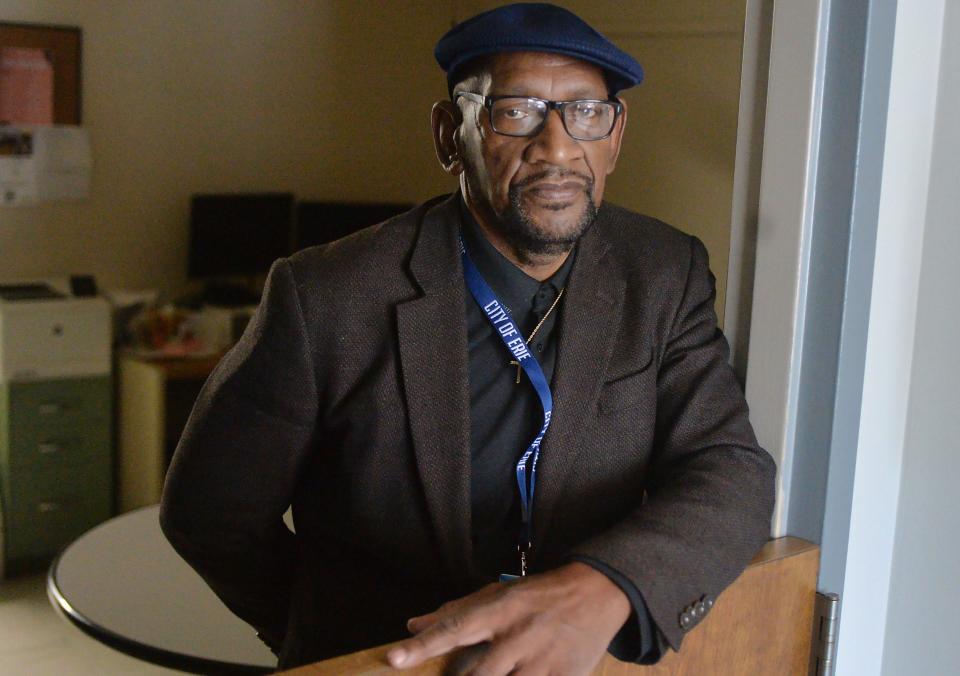
You’re talking about the private meetings between members of the minority community and local law enforcement hosted by the U.S. Department of Justice prior to the pandemic and the city's Strengthening Police Community Partnerships (SPCP) program that emerged from that under the Schember administration?
Absolutely, yes. Those initial sessions were tense. It was heated. It was raw. And for the most part, it was honest and that made it healthy. It needed to happen. I think it's what spared Erie a lot of the worst moments experienced elsewhere after George Floyd's killing.
Erie is a unique place by virtue of its size and the already existing relationships that Erie has. If each one of us were to search within our circles, we could find somebody in our circle who knows somebody in the next person's circle. We're all interconnected. The success of the Blue Coats has always been driven by the connections we have been able to find and use to address the issues. At a school, for example, somebody on our team is going to know somebody who is related to a young person at risk and find the person in that family who has the greatest influence and connect with them to get this child the attention and help they need.
Spiritually, I believe that Erie is a unique place that could be an example for the rest of the state, maybe even this country. I believe that wholeheartedly because the demographics and the size of Erie make it just right to be the perfect example, good or bad, depending on how we deal with our problems. My pastor used to always say God wants to show his hand in the city of Erie. I think that is realistic and I want to be a part of that.
Your approach to the city's deepest challenges and divisions has always been rooted in spirituality.
Definitely. I know I could not be in this position today without a spiritual foundation because there are so many misconceptions that are being floated, even promoted sometimes, to fulfill agendas.
Is that on both sides?
That is all sides.
Here is the real deal. Problem-solving 101: First, there must be a confession, an acknowledgment that there's a problem. Step two will always be, "What part do I contribute to the problem?" If a person is serious about solving the problem, they'll do step two, because the problem begins to alleviate the minute I remove my part from it. That does not mean it won't persist. But it gets a lot easier once I stop contributing to it because everybody, 99% of the time, contributes something to the problem.
When you remove yourself from the equation, it's a lot easier for you to deal with step three: What is the truth? What is the right way to look at this? Or, as I like to say, what does God say about this problem? Because God is going to be 100% thorough in identifying the contributing factors. Most of the time when I use that process, especially as a pastor, we never get to step four because the problem gets solved when we identify truth.
Now there's some bigger things that won't work out quite that easily. But identifying truth gives you understanding. You will ask the rest of the participants to take the same view of this thing. And as long as you have truth in front of you, you always win whether the other actors persist in contributing to the problem or not. They will never be able to annihilate the truth. They will find themselves standing alone and continuing the problem. They won't last because the universe is on the side of justice. You can only go so far being negative before you destroy yourself. I know that's philosophical, and people might not see it, but it does really work out that way.
What is an example?
Take racism. This is what the Department of Justice did by setting up those face-to-face meetings. They put community members in the basement with the Erie police department. They said, "They're going to talk and you're going to listen. And we're going to come back and you're going to talk." This is where understanding kicks in: There's been some contributing factors on both sides. I know, for example, that in my anger, my bitterness and my ignorance, I perpetrated and fostered some negative energy. Even though I knew that every cop wasn't bad, there was a time I wouldn't dare say that because I didn't want to stand out and be ostracized. Or, I just didn't want to admit it because I was angry.
In those listening sessions, I can tell you the tension in that room started to dissipate because in the listening, the members of the group found more commonality than difference. The key now is getting that energy out of that room. They've been working on that, but we have a long way to go because this divide didn't happen overnight.
The dialogue has to continue, and it has to become more widespread. There must be ownership all the way around. There is some deep-rooted, longstanding bitterness, rightfully so. But I think that's what the problem-solving steps are about, seeking to understand the problem and understanding myself in response to the problem. Most people will say, "If I'm expecting change, I have to be willing to change too."
Racism can only be dismantled by the architects of racism. Our mayor has a lofty and grand vision to eliminate racism in Erie, Pennsylvania. I have told him that I don't think we'll see it in our time. But I want him to keep that goal because I believe that's the type of energy we need to foster so the generations to come can take it to a higher level because you're talking about something that's over 400 years in the making. It takes great courage for Mayor Schember to say that, and I applaud him. I'm sure that is not, in certain circles, welcomed. But somebody needs to feel that way and maybe there will be another Joe Schember who will come along with the same heart and spirit who will build on what the current Joe Schember has put in place. I want to help him put that spirit in place.
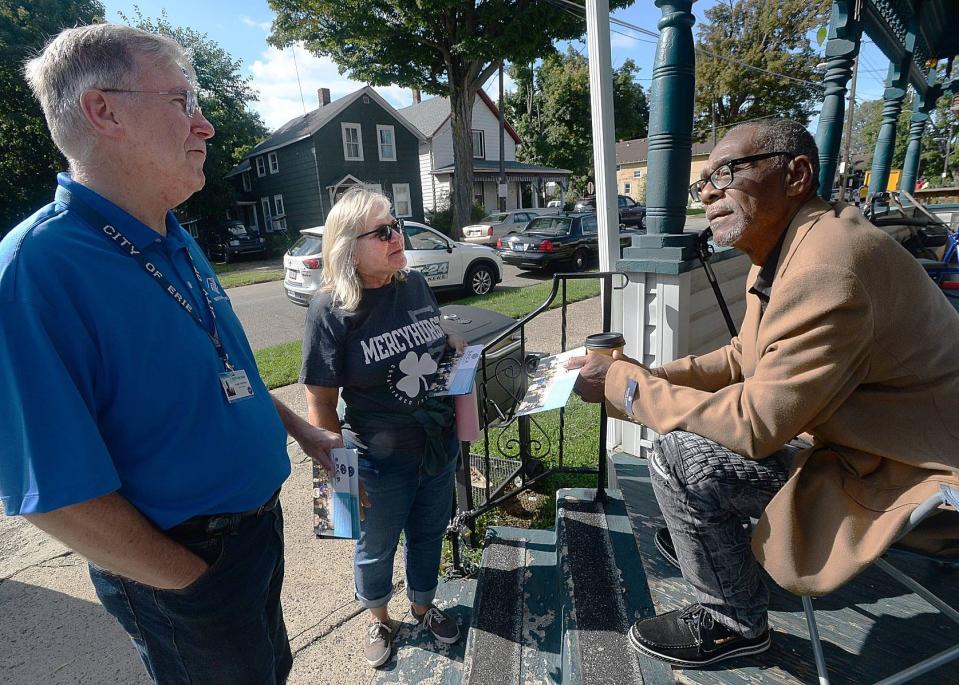
You start by having that desire and in the meantime, do all you can to not perpetuate it anymore and work with your circle of influence and do what you can so that somebody can come behind you to build on it. Isn't that what Martin Luther King Jr. did? What Jesus did? Jesus said, "Greater work you shall do." That's what those of us who are supposed to be believers are supposed to be doing.
How do you get the whole world on that page? I don't know. I don't know if you can, but I believe that all who are willing can make a great enough impact that we can make things a little better. We can ease some of the bitterness and strife. I know there are people who are invested in division and I will say that you could probably find some all the way around and in all shades. That's not talked about enough. But at the end of the day, neighborhood by neighborhood, street by street, block by block, city by city, it has to happen. I just want to do my part be able to bring understanding, information and opportunity everywhere.
What will that look like as community liaison?
I think there's a great misconception about the liaison's role. The liaison has no influence or power to make decisions to address the concerns of our community or the city. But the liaison can connect the two, connect the right individuals with the right information.
If I can help people from the city's standpoint understand the city at large and its communities and peoples by bringing back the exact information from the people to the city and likewise from the city to the people and put a bridge there, then I would love to be able to give that a try. I want to be a good communicator and reach out and say, "What are your thoughts? What is it that you want to accomplish?" And take the exact information back to the city.
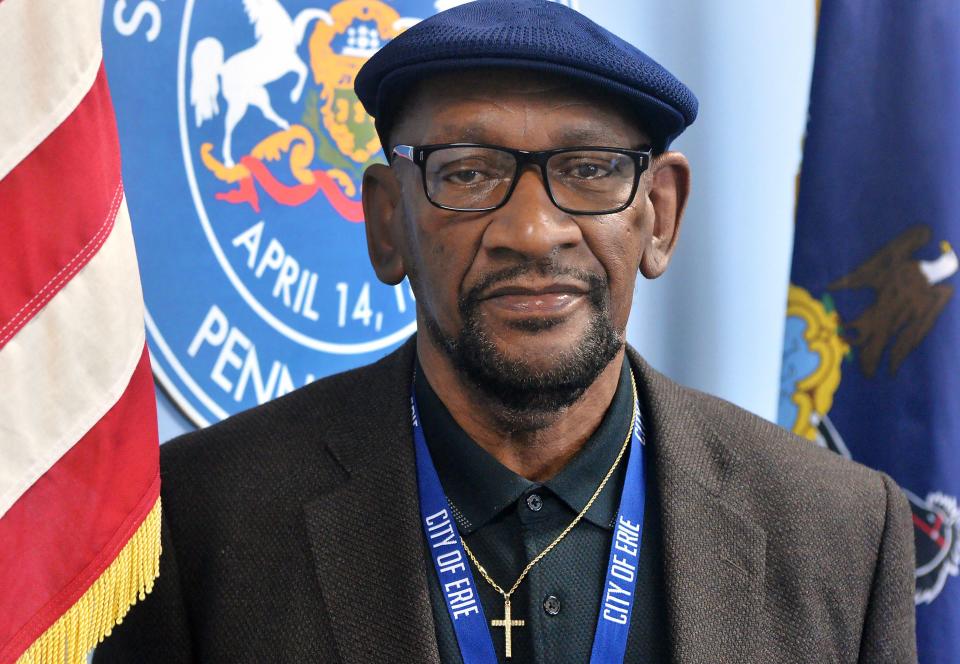
I don't want to be the focus of or add to any problem. I don't want to bring my personality into play. I want to remain the conduit and be sure that the conduit stays open.
So I look at this position as a communications opportunity. A recent vigil for missing Erie man Dijone Redd is an example.
You opened that Good Friday prayer service for Dijone by explaining in detail the guidelines for reporting a missing person to police and how the city responds to those reports.
There was a misperception you must wait 30 days to report someone missing. Imagine how many people have gone missing and strayed away from their normal pattern but the loved ones are thinking, "Well, I have to wait a little while before I report it." Maybe if they would have said something earlier, they could have gotten answers earlier. We must ensure the right information is shared so people don't suffer needlessly.
I see the liaison as a bridge that could hold or bring people together.
I know that there will always be people who will shy away from the truth because it's convenient or because some of us are addicted to our bitterness and anger. I don't know what to do about that other than to pray and hope.
Will your anti-violence work be a piece of this?
Violence is definitely a part of that communication mission because I don't think there has been much published about the behind-the-scenes efforts. The reaction in some quarters to the Unified Erie anti-violence initiative was crazy in the beginning. At no time was Unified Erie ever set up to get anything from anybody other than a change of behavior and offer them tools and resources to help them make the change. Since it started, people have been steered away from those behaviors and other people have not taken the advice and they have experienced the very things we all were afraid were going to happen — jails, institutions and death. But that was going to happen regardless of whether there had ever been a Unified Erie or not. There is no good outcome from the perpetration of violence. I don't care how it's been glamorized in videos and rap records and movies. Nobody perpetrating violent acts ends well.
When I was a young man, leaders in Buffalo were able to reach out to the so-called leaders of all the gangs in the city and bring us together, but there were teeth in it, because they made paid job-readiness training and resources available to us. They took a video of us doing a symbolic street cleanup where we took all of our gang colors and threw them in the middle of the street and burned them.
We never picked them back up because of the resources that were provided. We were funneled into the education center and job-readiness training and jobs. And we had given our word that the city is now open no matter what neighborhood you're from and if anybody from our so-called group violated that, he had to be dealt with by us.
Will you be able to facilitate that kind of support in Erie in this role?
My main priority is to articulate any resources and opportunities concisely and widely, but specifically to those who are at the greatest risk and who feel that their backs are against the wall and they don't have any other choice.
I've told you my story about feeding my little sisters and brothers flour, water and oil, trying to make them bread to eat. Today's version of that for at-risk kids, I guess, would be ramen noodles. It is not a healthy diet. We want to get real opportunities to everybody.
When the city has opportunities, the liaison will communicate it back to the people who are seeking opportunity. You also have individuals who are working to better the conditions of those who are most in need in our neighborhoods, and when the city has an opportunity to meet those needs, it's my job to put out that call and say, "This is what's available."
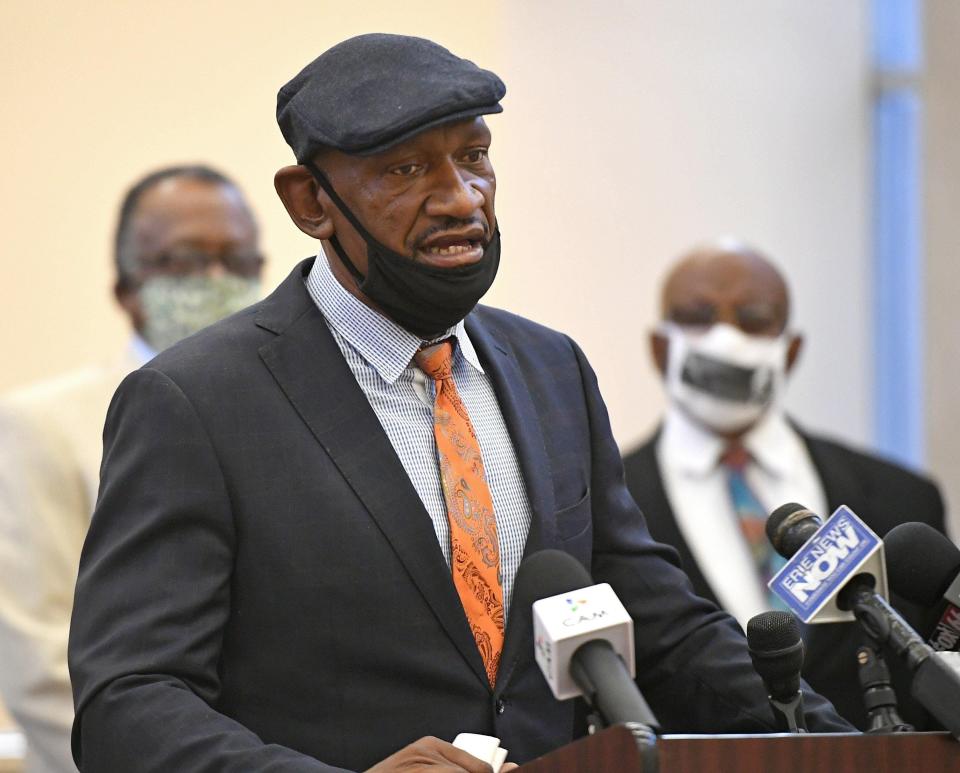
Just yesterday, I got an email from Rob Lee, the city's director of communications, concerning a plumbing apprenticeship program. We know that every kid who is in our high schools right now is not necessarily going on to college. Some of these young people come into school desiring to go to work instead. Well, this is paid training. How nice it will be to talk to a kid who wants to work after graduation and say, "Have you thought about this? It has unions. These are jobs with benefits, where you can open your own business and make a ton of good money and create opportunity for your family members to come."
There are also first-time home ownership programs. It is the liaison's job to make sure information about opportunities like that in the city are being communicated to those most in need.
I don't know what it is going to take to recruit young African Americans and Hispanics and new Americans to go after law enforcement positions. But I'm also going to try to encourage as many as I can to file the application, take the test and put themselves in a position to acquire a position.
I can't sit down and say, "You don't have enough Black policemen," but not be willing to work with the recruiting of Black policemen. Especially if you are the kind of person who would tell individuals, "You don't want to be a cop because they're against us and you will be a sell out." That happens too. So I have to do my part to make amends from my platform and promote as much goodwill and opportunity as I can.
Besides opportunities, if there are problems in the community that are being perpetrated or are not being sufficiently addressed by city government, it would be my job to take that information back to the administration.
Will you conduct structured outreach or will it be more organic given the ties you already have in the city?
A little bit of both. Before I even applied, I began to reach out to get feedback and input from different individuals I respect and trust. Bishop Dwane Brock was my first call. I love what he's done at the Eagle’s Nest, taking that whole east side area and making it produce. At that campus, I see a reflection of the African American community that's unparalleled in this city. It's a constant flow of people of color doing great things with children. I'd love to see that duplicated.
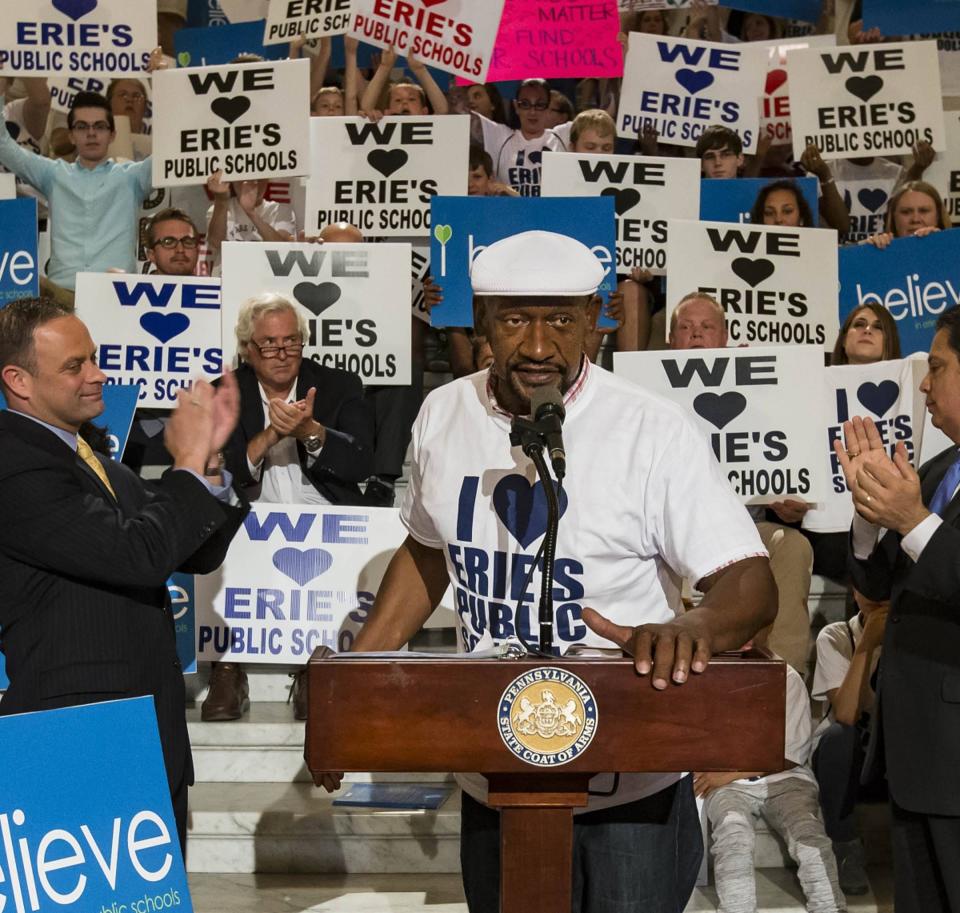
There are a couple of other great projects in the city. The Erie Center for Arts and Technology, my God, the life that was put back in this neighborhood. It's amazing to ride past here on any given evening and see children and families coming out to enjoy or watch their child play sports or partake of some initiative going on inside this space. Then all day long, you have the clinic, a pharmacy, and offices for Erie's Black Wall Street and the Blue Coats. Brother Shannon Pullium has done an amazing job. I would love to see him get a lot more support because (through ShanPullSports), he has made this place as vibrant as any other effort in Erie. Watching the Jameson School of Nursing and the students showing up with their scrubs on, knowing that when they complete school, they're going on to well-paid jobs, serving humanity, it doesn't get any better than that, but it needs to be duplicated and prevalent in every neighborhood. I love what's going on in the East Side Renaissance on Parade Street, giving ownership and trying to encourage business to come back to Parade Street. Parade Street was once very vibrant. There were tons of businesses but not a lot of African American businesses.
I'm not just the liaison for the African American community. I am to reach out throughout the city. But the administration does have areas of priority and I am prioritizing them and those are based on need.
It's an Everyman position. You have to be everything to everybody, an ambassador of goodwill, wishing and hoping the best and trying to carry that spirit of goodwill between all demographics.
Will you still be a part of the Blue Coats?
That's my life's work. I'm still involved at every level. But we have a core group of people like brother Roscoe Carroll. He's been running the day-to-day operations for a couple of years and he's a great leader. We have the biggest outreach team in Erie.
Does Strengthening Police Community Partnerships still exist?
We're regearing that. They had the snack patrol for school kids. We're redoing that. You'll see a lot more outreach with a deliberate focus on recruiting and the willingness to have those hard conversations and learn. Erie Police Inspector Chris Janus is going to be heading it up. He has really impressed me with his willingness to listen to tough, uncomfortable stuff and not shy away. One of the things we all talked about is that I'm only going to be the same Brother D that you've always seen. I am not here to be a "yes" man or a sugarcoat guy. I will never do that. But I do believe it's important to have understanding because it is the principal thing that either makes or breaks us. Lack of understanding will keep us tossed and twisted. Understanding can move mountains. That's part of my job description — to give understanding from the different platforms that I go between, whether it be the school district, community at large, the Blue Coats, the city of Erie Bureau of Police, the mayor's office, and more, because we hear from every department.
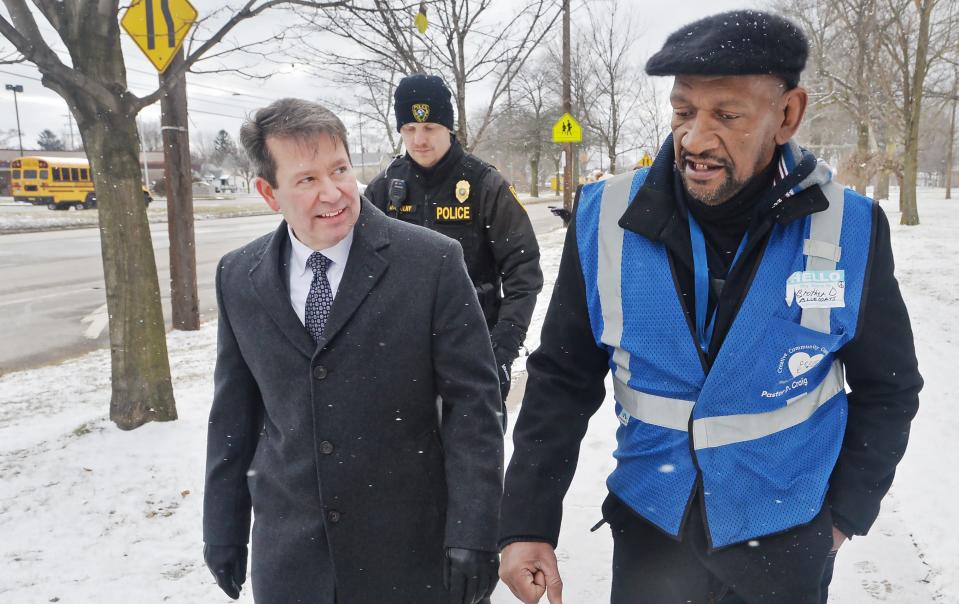
An extraordinary personal journey led you to this point. As we have reported in the past and as you have reflected, you were homeless as a child after your family experienced a crisis and you became involved in a violent gang as a young man in Buffalo, New York, but then you came to be a leading advocate for peace.
The real reason for taking this position is to show other people that you can overcome anything, but you have to play a part. I want to be an example for others who feel like they are on the verge of giving up or not trying, to let them know you need to show up and keep putting one foot of faith in front of the next and you can land in a great spot.
I know a lot of people who didn't necessarily achieve according to the standards of the world. Maybe they made a few mistakes. You can't let that be the author and finisher of your life. You get to decide how you end your story. Hopefully for somebody who's gone through some of the things that they've seen me go through, it inspires them. I didn't take the job for monetary reasons. It's more about using every tool in the box to encourage and inspire somebody. I think we all have that obligation.
Your work has long demonstrated a deep sense of compassion. Where do you draw that from?
It is a little bit of me giving back what was given to me. But it's a lot of desire because I know what it feels like. I've been there. I know how important and easy it is to just take a moment and say, "How you doing? You are going to be all right."
I told the story at the missing person's vigil about what happened in my family when my mother went missing. You know how good it would have felt at 9 years old to have somebody put an arm around me and say, "Man, you're going be all right."? Had that happened, it could have changed a lot of things for me. So I don't want to miss my opportunity to help others.
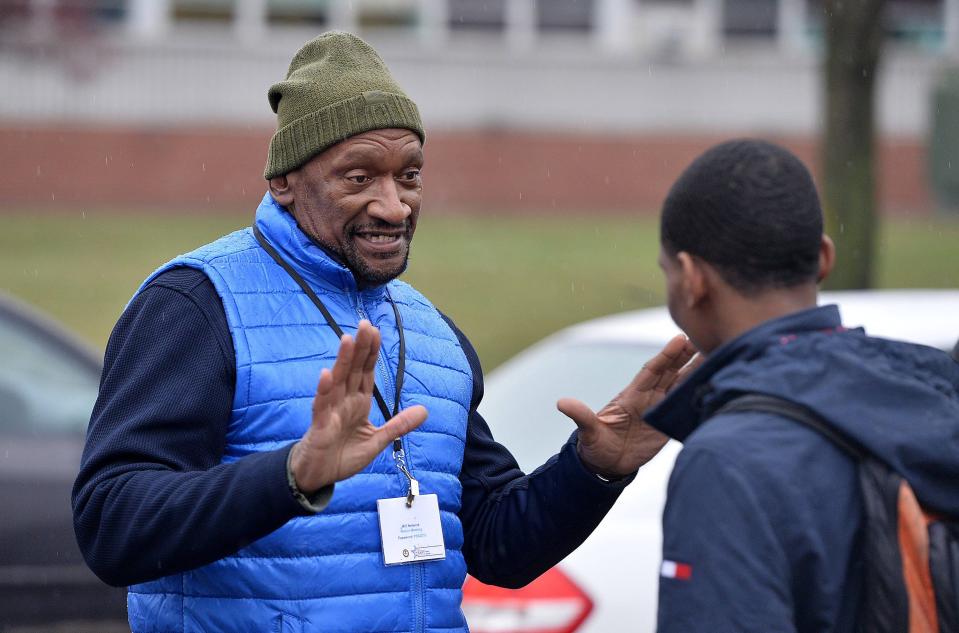
I look back over my life before the whole implosion. My mom and dad were always helping people. I remember a family who moved from the south. The mother died not long after they moved up to Buffalo. But my mom got the father into some adult education classes and he learned how to read and write and he was so proud of himself. And she helped him get his son into school where he could graduate and go to college.
I remember my father delivering groceries and Christmas trees to different people's houses who didn't have money for a Christmas tree and me going with him. I remember my father fixing people's cars and cutting kids' hair, not for money. He was the neighborhood fix-it guy. So it wasn't as though service was strange to me.
You had that foundation before it got completely, as you said, "imploded" and you had to rebuild yourself.
I had to come to myself. I ran into darkness to hide. I didn't like the way I felt. But, I kid you not, when I decided I was done with the whole drug scene and everything, and I came to myself, nobody had to tell me what to do. I got some great help from some great friends who were just waiting for me because they had been through the same thing and they had experienced their turnaround. But I knew instinctively what I should be doing anyway, and especially as it pertains to how I should be dealing with other people. I knew I was supposed to help other people. I knew I was supposed to be respectful and kind because these were the principles I was born into.
So the thing was to get into myself, but get out of myself at the same time. And it became so it wasn't something I'm trying to do, it is just who I am. I would always say that about us, especially the original Blue Coats. We're not trying to do anything. We are being who we are and we are concerned about our community and its people. And so if it calls for us to pass the hat and pay somebody's rent, or speak on somebody's behalf, or work with some kid who we know is not going to show up so we have to work overtime to get him to go to school, that's what we're going to do. We would do this without the label of being a Blue Coat, or anything else — because it's the right thing to do.
That principle of personal accountability has always informed your peacekeeping work and message.
Who wants to live in a community where bullets are flying through people's windows? I live here. I've told you about coming home and seeing crime scene tape on my porch. How real was that? I had just had a meeting with Daria Devlin, the executive director at ECAT, about two weeks before that. And I said Daria, "We experienced this violence too, because we live in it." I had no clue that my next-door neighbor was going to be killed and that the kid who is charged with killing him is somebody related to me in a distant way. And I know how hard the mom worked to give her kids a good life, both the mothers, in fact, which tells me this: Nobody's exempt when it comes to violence in Erie. My daughter was in the house by herself next door. A bullet could of come through that wall. I can't sit back and act like it's just the police chief's responsibility. If I did, next thing I know I'm on the victims' list when I could have possibly done something or said something.
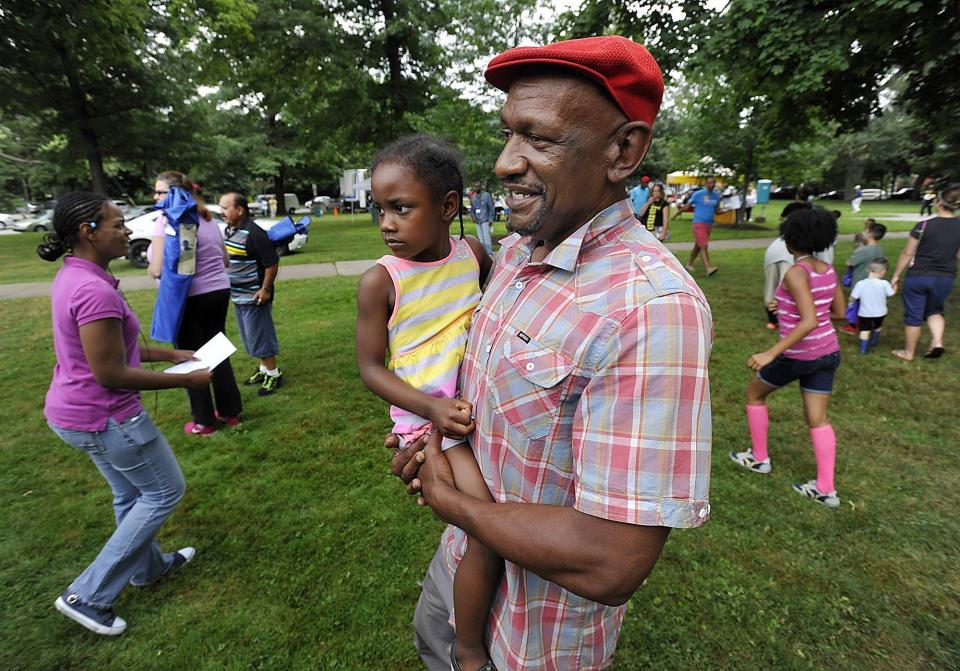
I appreciate the love I get from the kids and the respect I get for the most part in my community and encouragement that I receive from the average person. My son has been shot twice. I'm thankful that he got himself out of his way. He's been working for some time with his family. They're doing good and have been for some time. I'm thankful that I was an example for him to see. He's the kind of kid who will sit down and talk with any kid who he meets and try to help because he has seen my work. My younger kids never witnessed anything that occurred in my earlier life. So there's a lot of good motivation for doing when I'm doing. I just want to be authentic and genuine to whatever I do.
That's the thing I'm holding onto. I make that known upfront. I am never compromising. I won't do that because there is too much at stake. And the main thing, to be selfish, is my own personal integrity. I live here. When they cut the lights out at City Hall, I'll be on Lighthouse Street. I don't drive into the city (from the suburbs) in the morning. I want everybody who knows me to know that what they see is the truth. What you see is what you get from me. I'm nothing different. And I don't get the whole mystique about a certain offices or titles. I mean, these people put their shoes on one foot at a time. The things people associate with titles are all illusionary.
A lot of stuff we fighting about is illusionary, too. This whole racism thing. How much stupid energy it takes to hate. That is too much work. It really is.
Opinion and Engagement Coordinator Lisa Thompson Sayers can be reached at lthompson@timesnews.com
This article originally appeared on Erie Times-News: Erie Blue Coat Daryl Craig is the city of Erie's new community liaison

